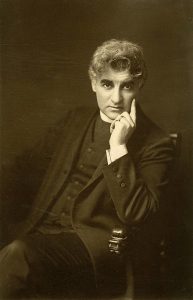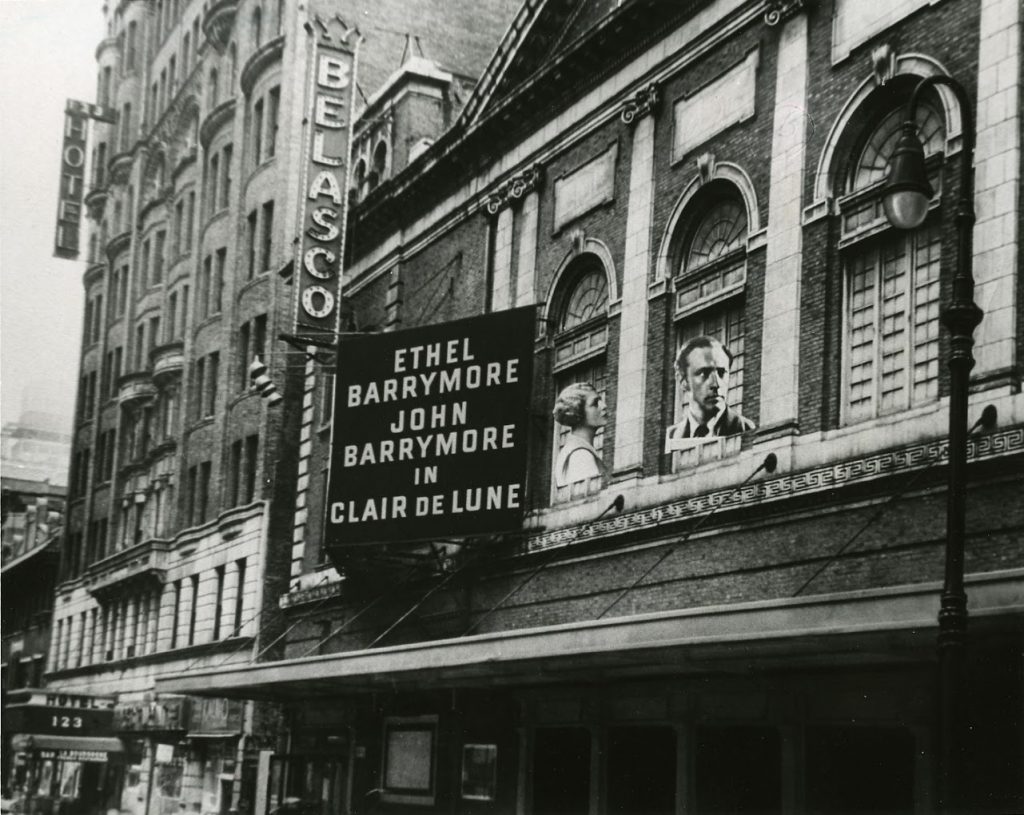Broadway Bubbies
By Robert Liebman
The entrepreneurs who launched America’s movie industry a century ago are household names today, men such as Szmuel Gelbfisz, Karl Laemmle and Adolf Zukory.
Gelbfisz? Laemmle? Zukory? Household names? In whose house?
Szmuel Gelbfisz preferred to be known as Samuel Goldwyn and, with Marcus Loew and Louis B. Mayer, formed MGM. Adolph Zukory dropped his Novelty Fur Company and the last letter of his surname to run Paramount Pictures. Bored with office work, Karl Laemmle created Universal Pictures.
The burgeoning industry attracted others. After the East European Wonskolasers emigrated to Canada and became furriers, Jack Wonskolaser became Jack Warner and, with his brothers, found gainful employment as movie producers.
Broadway’s foundations are similarly kosher, starting with the founders and continuing to the present day.

David Belasco
While the Founding Furriers were fiddling with film, entrepreneurs such as David Belasco and the Shubert Brothers were injecting new ideas and new energy into Broadway.
Despite his nickname as the “Bishop of Broadway,” Belasco was Jewish (his nickname reflected his fondness for clerical attire), as were the Shuberts and another leading owner-producer-manager of that era, Charles Frohman.
Belasco 1853-1931) was born in America to Sephardic Jews who emigrated from London to California, enticed by the general prosperity associated with the gold rush of the late 1840s.
A prolific writer, director and producer, Belasco helped launch the careers of stars such as Mary Pickford and Barbara Stanwyck. His innovations in lighting and special effects brought more realism to the stage. A venerable Broadway theatre today is named after him.
Born in Ohio and raised in New York City, Charles Frohman (1856-1915) cultivated individual performers—Ethel Barrymore, Billie Burke and William Gillette are perhaps the best-known today—and was a co-founder of the Theatrical Syndicate which controlled playhouses across America. The stage manager at one of his theaters was David Belasco.
Frohman also partnered with British producers mounting plays in London. He was, in fact, returning from Britain to New York when he met his death, a passenger on the Lusitania when it was torpedoed by a German submarine in 1915.
Sam, Lee and Jacob Shubert, all born in America, were the sons of Latvian Duvvid Schubart [sic], immigrants from East Europe who settled in Syracuse, New York. In addition to producing plays, they gobbled up theatres, successfully challenging Frohman’s monopoly, and currently own more than a dozen Broadway theaters and numerous venues elsewhere in America. Their nearest competitors are the Nederlanders (another brother-oriented Jewish family, from Detroit, Michigan), with nine theaters.

The Shubert Theater on Broadway is, not surprisingly, owned by the Shubert Organization. They also own the Belasco.

One of their commercial rivals had an all-American name—Abraham Lincoln Erlanger—but was actually Jewish, as was his partner, Mark Klaw.
Full Steam Ahead
The artistic world of these owner-producers was transformed, in 1927, by a single play, Show Boat. Set in the segregated American south, it has no Jewish subject matter at all but was created entirely by Jews: Jerome Kern composed the music, Oscar Hammerstein II wrote the lyrics, and Edna Ferber wrote the original story.
Kern was born in Manhattan to parents from Germany and Bohemia (his mother’s maiden name was Kakeles) and, thanks to a Thames River cruise, he married a woman from Surrey, a suburb in southwest London. When the boat on which Kern was a passenger stopped at a pub, he was served by the barwoman, the publican’s daughter. Long story short: Jerome and Eva tied the knot in an Anglican church in Walton on Thames in 1910.
After working with Kern and Lorenz Hart, Hammerstein – Jewish on his father’s side – collaborated with Dr. William Rogazinsky’s son, Richard Rodgers, a partnership that resulted in, among others, Oklahoma, Carousel and South Pacific.
Ferber won a Pulitzer Prize for her novel So Big (1924), and her later novel, Giant, was made into a film starring Elizabeth Taylor, James Dean and Rock Hudson. Her father was born in Hungary, and her mother had German ancestry.
Show Boat was “the most important work in American musical theatre: it sums up what’s gone before and points the way ahead,” notes Mark Steyn in his informative and witty Broadway Babies Say Goodnight (1997). “And Hammerstein is the most important single figure, for similar reasons: he worked with Romberg and Kern, and he trained Stephen Sondheim.”
In 1927, the same year that Show Boat fused music and story, film techies synchronised sound with image and created the first “talkie”—The Jazz Singer. Al Jolson starred as a cantor turned crooner, from a story by Samson Raphaelson. The producer: Warner Bros.
Financially, the Jewish producers missed out on Show Boat. The privilege, and profit, went to Florenz Ziegfeld, the gentile producer best known for his Follies.
One of his most famous Follies girls was a native New Yorker from the Lower East Side, Fania Borach, a.k.a. Fanny Brice.
A versatile singer-comedienne, Brice became even more famous posthumously thanks to another supremely gifted singer-actress, Barbra Streisand, who played Fanny in Funny Girl on Broadway and in the film adaptation.
Fanny is intensely, insistently and unapologetically Jewish. “Oy vey, what a feeling;” she sings when handsome gambler Nicky Arnstein takes her to dinner. “Would a convent take a Jewish girl?,” she wonders when she realises where his courting is rapidly leading.
Like Show Boat, all of Funny Girl’s seams were sewn by Jews: music by Jule Styne (born in London to grocer parents originally from the Ukraine); lyrics by Bob Merrill; book by Isobel Lennart. The stage and film versions were directed respectively by Garson Kanin and Ray Stark, husband of Frances Arnstein (Fanny’s daughter).
Two other prominent Jews were part-timers who did not make it into the credits. One was choreographer, director and producer Jerome Robbins (ne Rabinowitz), one-third of the legendary trio—with composer Leonard Bernstein and lyricist Stephen Sondheim—who created West Side Story a few years earlier.
The other was omnipresent Broadway producer and publicity maven David Merrick (ne David Lee Margulois). His biography, by Howard Kissel, is titled The Abominable Showman.
In the Funny Girl film, Jewish Arnstein is portrayed by Egyptian Omar Sharif (“the groom was prettier than the bride”) and non-Jew Ziegfeld was played by Walter Pidgeon, son of Caleb, a haberdasher, and Hannah.
Funny Girl previewed at The Shubert Theatre in Boston and had a profitable 1,348 performances at several Broadway theatres. A decade later, a show that started off-Broadway, A Chorus Line, topped more than 6,000 performances and came to the financial rescue of its producer, Joseph Papp, Samuel and Yetta Papirofsky’s son. An advocate of free outdoor Shakespeare, his Public Theatre in Greenwich Village was popular and prestigious—and perpetually poor. With Chorus Line, Papp’s begging days were over.
One Fine Day
According to a recent New York Times obituary, Broadway itself needed help, and in Jack Goldstein (d.2023), it found “A Savior of Broadway.”
Due to Goldstein’s lobbying, several theatres received landmark designation, and the reduced-price TKTS outlet got a stunning new design.
Goldstein’s love for theatre began when his grandmother took him to his first Broadway show, Lionel Bart’s “Oliver!,” a London production which transferred to New York in 1963 and was produced by David Merrick.
US-UK swaps are nothing new. In 1900 a London theatre staged a play, adapted from a short story, about a tragic love affair between an American naval officer and a Japanese girl. Composer Giacomo Puccini, on a visit to London, saw the play, returned to Italy and wrote Madame Butterfly.
The author of the original short story was an American lawyer. The writer who adapted it for the stage was David Belasco. ###
Copyright 2024 by Robert Liebman. All rights reserved.
